 Image: Parradee/Adobe Stock
Image: Parradee/Adobe Stock
Artificial intelligence (AI) is transforming advertising by replacing generic mass marketing campaigns with highly targeted and relevant ads created by and personalized with AI. The latest AI and machine learning technologies make it possible to tailor and optimize marketing messages at scale. By harnessing large amounts of data and helping businesses understand their customers’ needs and preferences on a personal level, AI lets you customize messages and recommendations at every stage of the buyer’s journey.
KEY TAKEAWAYS
- •AI-powered personalization delivers tailored experiences that enhance customer engagement, loyalty, and retention.
- •Implementing AI personalization in marketing requires careful consideration of data privacy and security, implementation costs, and ethical implications.
- •Essential tools for AI personalization include customer data platforms, machine learning algorithms, marketing automation platforms, personalization engines, and analytics tools.
5 Benefits of Using AI Personalization for Marketing
Personalizing your marketing campaigns can give your content a human touch and boost revenue, letting you deliver tailored experiences to better engage individual customers, make data-driven campaign decisions, and increase sales.
Highly Targeted Ads
Targeted advertising lets you reach the right audience with the right message at the right time. Customer data plays an important role in personalizing ad experiences. AI algorithms can analyze vast amounts of data to identify patterns and preferences. Unlike traditional advertising, AI helps brands enhance ad targeting and segment audiences based on demographics, interests, buying histories, and more. With AI, marketers can launch hyper-targeted advertising campaigns that resonate with individual consumers.
Engaging and Relevant Customer Experience
While AI solutions don’t replace human support agents, they optimize workflows and deliver customized content to customers. Businesses can use AI technologies such as natural language processing (NLP), machine learning, and sentiment analysis to understand individual preferences and behavior across various touchpoints. Marketers can identify patterns and factors used to build more valuable relationships, so they can tailor recommendations for products and services or deliver personalized support.
Increased Sales and Conversion Rates
AI can analyze customer preferences, purchase histories, and browsing behaviors to help you customize offers and discounts for individual customers. With AI, your business can implement statistical data modeling and machine learning techniques to predict buying patterns, sales opportunities, and market trends. Understanding customer needs better enables brands to make products more appealing to customers and can significantly increase the likelihood of conversion.
Enhanced Customer Loyalty
Personalization helps companies develop comprehensive and customized profiles of customers to better understand how to serve and retain them. Businesses can use them to tailor loyalty programs and relevant rewards. AI can also predict future purchases or the likely churn rate, which refers to the percentage of subscribers who discontinue subscribing to a service or product. AI also automates campaigns, so personalized content can reach customers at the right time via the right marketing channel.
Optimized Marketing Efforts
AI algorithms can consistently monitor and analyze campaign performance, helping marketers adjust their strategies in real time to maximize results. AI generates data-driven recommendations so businesses can optimize their resources and enhance campaigns for specific marketing channels, increase brand awareness, and engage with customers effectively. AI can also predict future customer behavior and preferences, letting you know which products, services, or content you should offer over a certain period.
Practical Applications of AI-Based Personalization in Marketing
For marketers, AI is a game-changer. As we’ve shown, it can analyze vast amounts of customer data to create targeted campaigns. But according to Babak Hodjat, CTO of technology solutions provider Cognizant, AI’s real power in marketing comes from orchestrating it alongside your business data to help make decisions that drive your key performance indicators. Your business has a range of options for how it might best implement AI-based personalization.
Watch eWeek’s interview with Cognizant CTO Babak Hodjat to hear more of his insights about the power of AI to reshape marketing.
Personalized Emails and Messaging
AI email personalization uses AI algorithms to customize email content for individual customers, which can significantly improve open rates, click-through rates, and conversions. According to HubSpot’s 2023 State of Generative AI Report, around 95 percent of marketers who use generative AI for email creation find the technology effective—and 54 percent rate it as very effective. Email marketing platforms analyze customer data, including past purchases, browsing history, demographics, and social media data, to send targeted emails with personalized product recommendations, offers, and content.
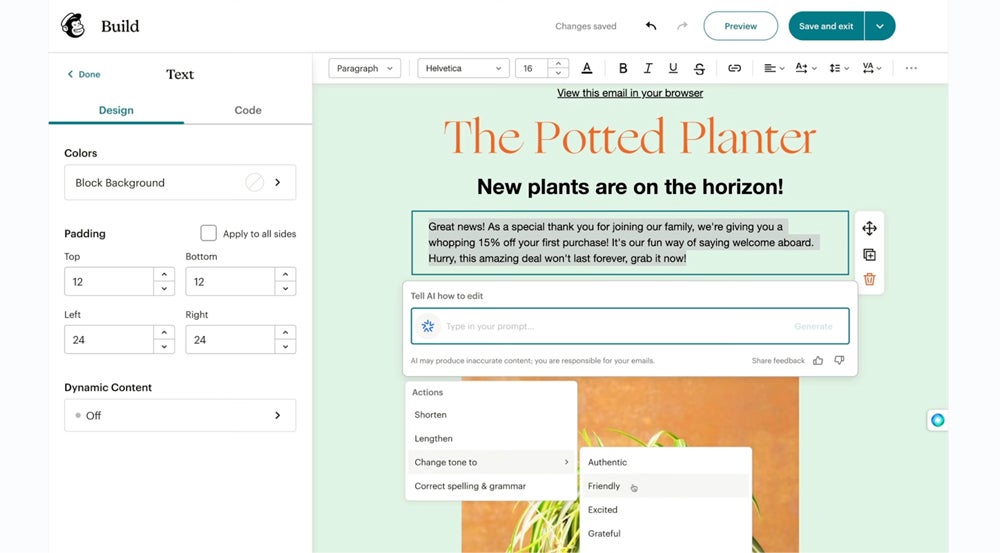 Mailchimp’s AI assistant allows users to change the tone of their email marketing messages to better fit their target audience.
Mailchimp’s AI assistant allows users to change the tone of their email marketing messages to better fit their target audience.
Tailored Product Recommendations
An AI-based product recommendation engine can analyze vast amounts of customer data to suggest products that align with individuals’ interests and preferences. By generating new data points from learned patterns, AI can recommend products disseminated on websites, apps, and by email to enhance the customer experience, increase sales, or improve retention.
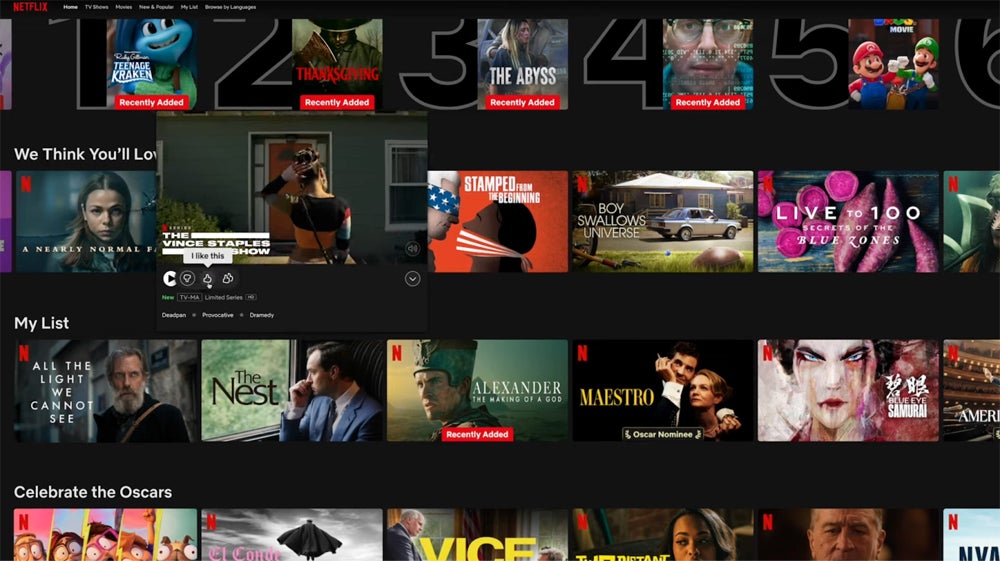 Netflix uses AI to analyze viewing history, ratings, and even what scenes users pause or rewind to tailor movie recommendations.
Netflix uses AI to analyze viewing history, ratings, and even what scenes users pause or rewind to tailor movie recommendations.
Dynamic Website Content
Machine learning algorithms analyze huge amounts of data to understand a consumer’s behavior and preferences. With this data, AI can personalize website content and display product recommendations, customized banners, and relevant call-to-actions, leading to a more engaging experience.
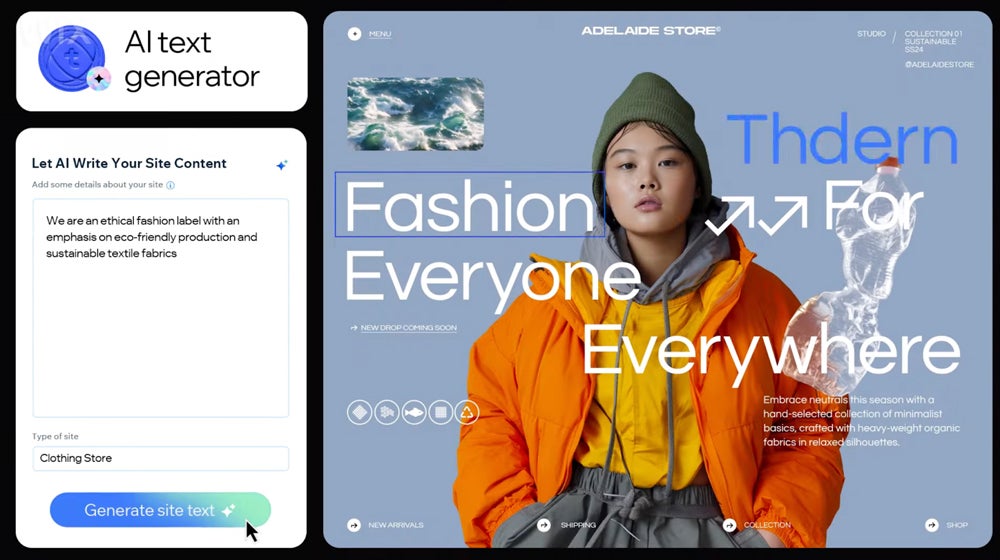 Wix ADI helps users quickly create websites by chatting with its AI website creator and then letting them refine elements like design, text, and layouts.
Wix ADI helps users quickly create websites by chatting with its AI website creator and then letting them refine elements like design, text, and layouts.
Predictive Analytics and Forecasting
Using AI for predictive analytics is more efficient than doing it manually because you can quickly collect, organize, and analyze data from multiple sources. Businesses use AI-powered predictive analytics models to forecast future sales volumes, trends, purchase likelihood, churn risk, and more. You can use the patterns and correlations in past sales data to launch targeted campaigns to encourage purchases and retain customers.
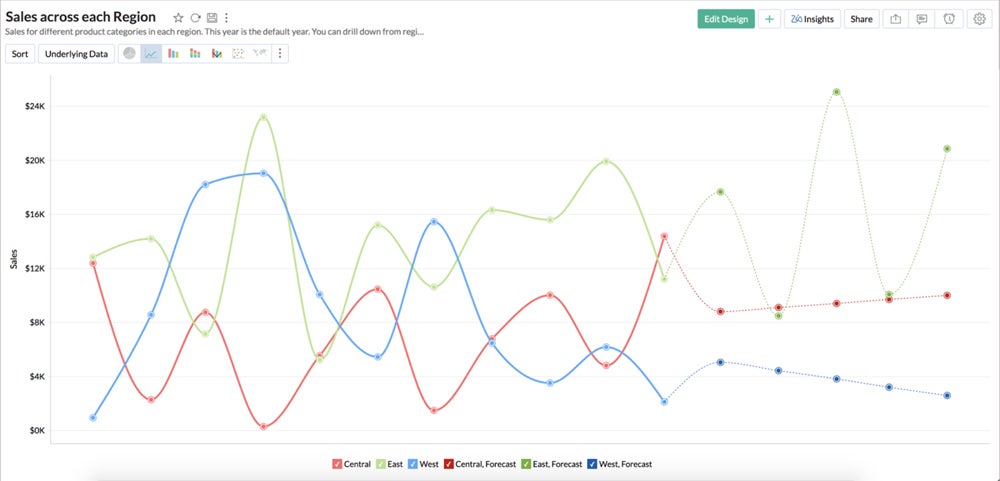 Zoho CRM’s Zia AI unveils future trends and patterns in sales data to help businesses make informed decisions.
Zoho CRM’s Zia AI unveils future trends and patterns in sales data to help businesses make informed decisions.
Language and Sentiment Analysis
AI sentiment analysis employs AI and deep learning techniques to determine the overall sentiment, opinion, or emotional tone behind textual data. AI-powered sentiment analysis tools can analyze customer feedback, social media posts, and reviews to understand sentiment and identify areas for improvement, so businesses can address concerns and improve their products or services.
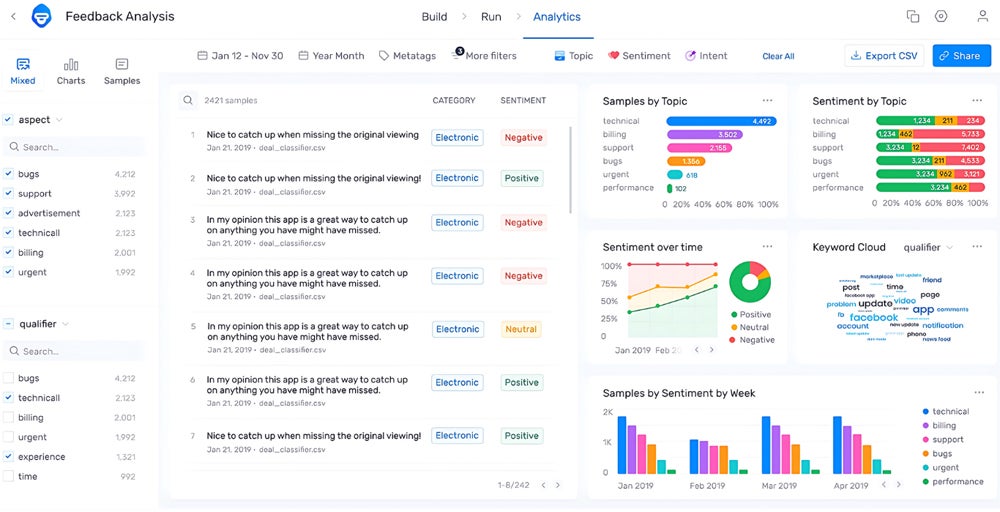 MonkeyLearn’s AI capabilities help marketers sift through social media posts, tweets, and comments and identify the overall sentiment behind them.
MonkeyLearn’s AI capabilities help marketers sift through social media posts, tweets, and comments and identify the overall sentiment behind them.
Assistive Search Features
AI-powered search engines play an important role in enhancing the user experience, using advanced algorithms to analyze user queries and provide personalized search results based on user history, preferences, and context. This helps users find relevant information more quickly and accurately.
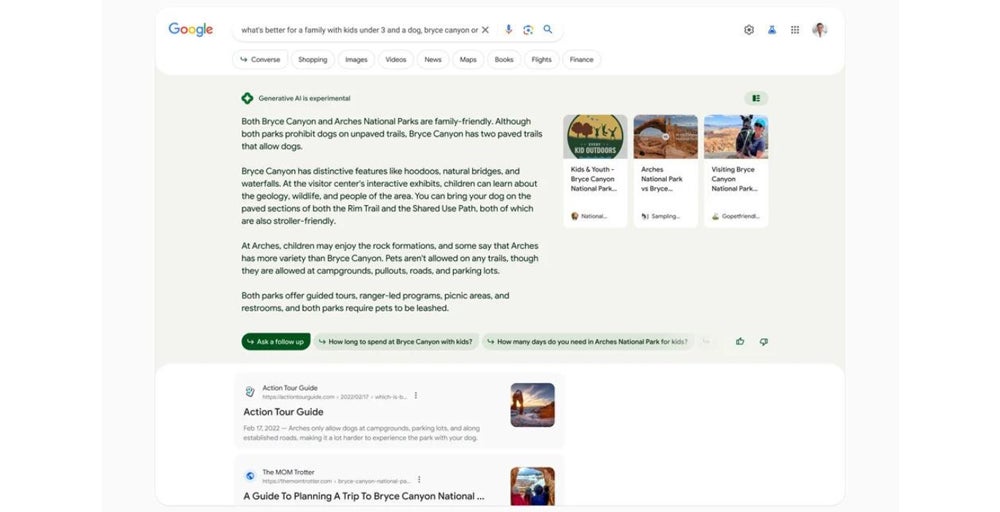 Google Search’s generative AI feature includes the ability to ask follow-up questions, allowing you to ask Google more about the topic you’re exploring.
Google Search’s generative AI feature includes the ability to ask follow-up questions, allowing you to ask Google more about the topic you’re exploring.
Challenges and Considerations for Implementing AI Personalization
While AI personalization provides numerous benefits for marketers and businesses, there are also several challenges and considerations—including costs, ethical issues, and data privacy and security concerns—that you need to be aware of before implementation.
Data Privacy and Security Concerns
AI personalization relies primarily on collecting and analyzing customer data, which can raise concerns about data privacy and security. Businesses need to ensure that customer data is collected and used appropriately in compliance with relevant regulations. Because AI technology isn’t confined to one state or jurisdiction, it can be challenging to create and maintain standard privacy practices and governance. Common data privacy and security concerns in AI personalization include the following:
- Data Collection and Consent: AI personalization relies heavily on collecting vast amounts of personal data, and it’s necessary to inform customers about what data is being collected and how it’s being used.
- Data Security and Breaches: Securing vast amounts of data increases the risks of data breaches and cyberattacks, making it essential to implement robust security measures.
- Data Bias and Discrimination: AI algorithms can cause biases if they learn from data that is unbalanced or reflects discrimination; AI models must be trained on diverse and representative data to avoid discrimination against certain groups.
- Filter Bubbles: One of the most common implications of AI-driven personalization is the creation of filter bubbles caused by excessive personalization, which happens when users are only exposed to information that aligns with existing beliefs, reinforcing existing biases.
Implementation Costs and Resources
AI implementation for marketing personalization requires a significant investment of financial and technical resources. However, the cost can vary depending on the complexity of the AI solution, business size, and marketing personalization goals. Common costs involved in implementing AI personalization include the following:
- Software and Platform: Licensing fees for solutions can range from hundreds to thousands of dollars per month depending on features, customization, and users, and some platforms offer pay-as-you-go pricing models or annual subscriptions; determine which pricing structure fits your budget.
- Infrastructure and Hardware: For customized AI solutions, consider the cost of servers, storage, and networking infrastructure; for more cost-effective solutions, consider cloud-based AI platforms to avoid the additional cost of on-premises infrastructure.
- Data Preparation: Before you can use customer data you need to collect, clean, duplicate, and format it. This process can be time-consuming and expensive if you need to deal with a large amount of data.
- Technical Expertise: Creating a team of experts—including data scientists, machine learning engineers, and AI specialists—can be expensive, and you’ll also need to train your marketing team to understand and use personalization platforms, which can incur additional costs.
Ethical Considerations
While AI personalization can enhance marketing strategies, it also poses several ethical concerns that businesses should carefully consider. Here are the most common:
- Transparency and Consent: Companies must be transparent about how they use AI solutions for personalization and should obtain explicit consent from users; customers should be fully aware of how their data is being used and should have control over what they want to share.
- Data Minimization: Businesses or researchers should collect only the necessary data for personalization and use it solely for the intended purpose; avoid gathering excessive or irrelevant information that might cause privacy concerns.
- Avoiding Manipulation and Coercion: Respect users’ autonomy and avoid manipulating them; manipulation and coercion might include restricting the available and acceptable options for users or offering material incentives.
- Bias Mitigation: This involves employing various techniques and methodologies to reduce the impact of biased data and algorithms; companies should also regularly audit and monitor algorithms to detect and correct biases.
Best Practices for Effective AI Personalization Marketing
Using the right AI personalization tools can improve marketing effectiveness. However, businesses should implement the solution strategically and ethically to optimize the investment they make.
Identify Audience and Goals
Before implementing your AI personalization strategy, clearly define your goals and identify your target audience. Be as detailed as possible in determining the outcomes you want to achieve, the resources you can invest, and the customer segment you need to reach.
Collect Data Thoroughly and Ethically
Ensure that your data collection practices are ethical and adhere to privacy regulations. Integrate data from other sources, like CRM systems, social media tools, and analytics platforms, to get a more comprehensive view of your customers.
Use the Right Tools
Invest in the right AI solutions or marketing tools to fit your goals, needs, and budget. Also consider the solution’s usability, scalability, built-in AI features, and customization options.
Monitor and Refine
Continuously test different strategies and monitor your results, so you can refine your marketing campaign based on data-driven insights.
Add a Human Touch
Incorporate human touch into your personalization strategy—for example, use AI to segment customers quickly but let a human customer support representative follow up on questions or concerns.
Remain Compliant
Comply with data privacy regulations such as the European Union’s General Data Protection Regulation (GDPR) and AI Act and the California Consumer Privacy Act (CCPA).
5 Essential Tools for AI Personalization Marketing
A wide range of tools are available to help marketers analyze customer data and use AI to personalize campaigns. They can generally be sorted into five types: customer data platforms, machine learning algorithms, marketing automation tools, personalization engines, and analytics and reporting tools.
Customer Data Platforms
Customer data platforms (CDPs) centralize customer data from various sources to create a unified customer profile. They allow businesses to pull customer data from any channel, system, or data stream and combine it into an accessible database to help companies create personalized customer experiences.
For example, Salesforce Data Cloud is a leading CDP deeply embedded in Salesforce’s Einstein 1 platform that combines CRM, AI, data, and transparency. This solution allows users to integrate an external data lake or warehouse directly into your CRM platform and offers features such as real-time data unification, AI-powered insights, and easy integration with Salesforce Marketing Cloud.
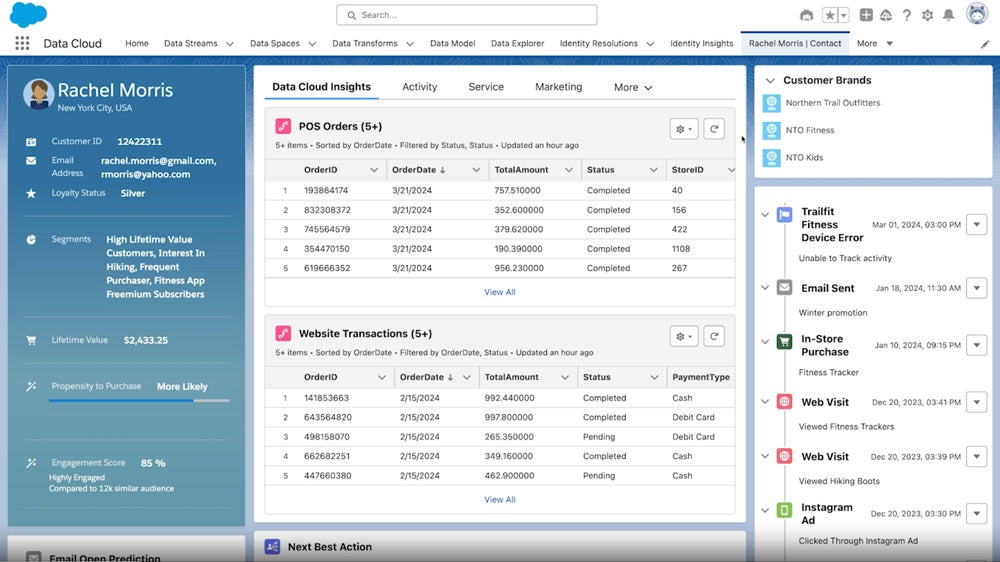 Salesforce Data Cloud harnesses AI to unify customer data from multiple sources and make it accessible and easily actionable by service agents, reps, and marketers.
Salesforce Data Cloud harnesses AI to unify customer data from multiple sources and make it accessible and easily actionable by service agents, reps, and marketers.
Machine Learning Algorithms
Machine learning algorithms are the backbone of AI personalization, as they allow users to view trends in customer behavior and business trends. Machine learning tools enable marketers to easily identify patterns, predict behaviors, and segment their customer base.
For example, Alteryx provides a powerful platform for users to employ machine learning models to reduce bottlenecks and scale data science processes. This ML solution has easy-to-use machine learning models, making it easier for the user community to share knowledge and collaborate. Alteryx is also flexible, providing users with a robust solution for building and deploying custom machine learning models specifically for marketing use cases.
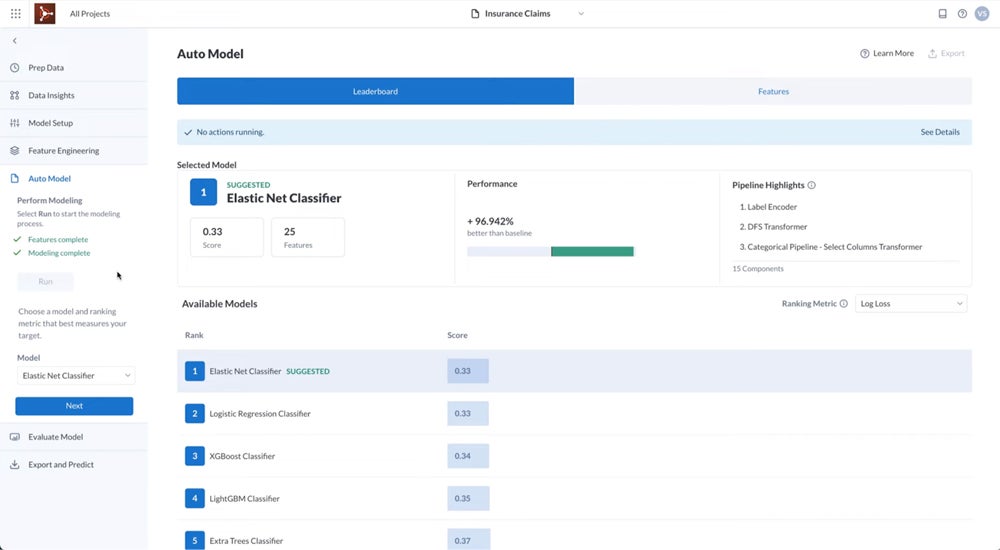 Alteryx’s machine learning capabilities enable marketers and business analysts to uncover insights and build optimized machine learning models.
Alteryx’s machine learning capabilities enable marketers and business analysts to uncover insights and build optimized machine learning models.
Marketing Automation Tools
AI marketing tools streamline marketing tasks and campaigns to let marketers focus on more creative endeavors and strategic planning. Integrating AI into marketing efforts helps you automate repetitive tasks, improve targeting and segmentation, enhance personalization, and predict trends.
For example, Jasper AI helps marketers generate personalized content for email marketing, social media, and customer service. Marketers can ideate and execute campaigns, communicate better with their teams, and optimize content with Jasper AI’s tools for automation, copywriting, analytics, and more.
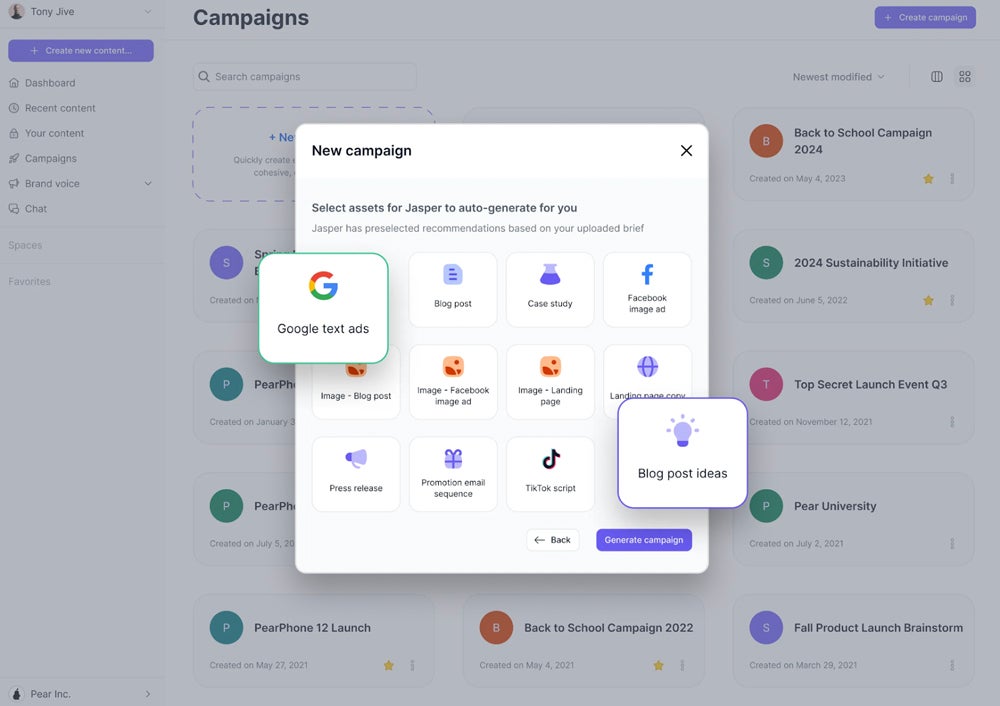 Jasper’s AI-assisted content feature helps marketers easily launch marketing campaigns from idea to execution.
Jasper’s AI-assisted content feature helps marketers easily launch marketing campaigns from idea to execution.
Personalization Engines
Personalization engines help marketers deliver and measure the optimum experience for customers by using AI algorithms to personalize content based on past interactions, current engagement, and predicted intent.
For example, MarketMuse is an AI-powered content strategy platform that helps marketers create personalized content relevant to their target audiences. Marketing teams can back their content planning, creation, and optimization with data-driven insights.
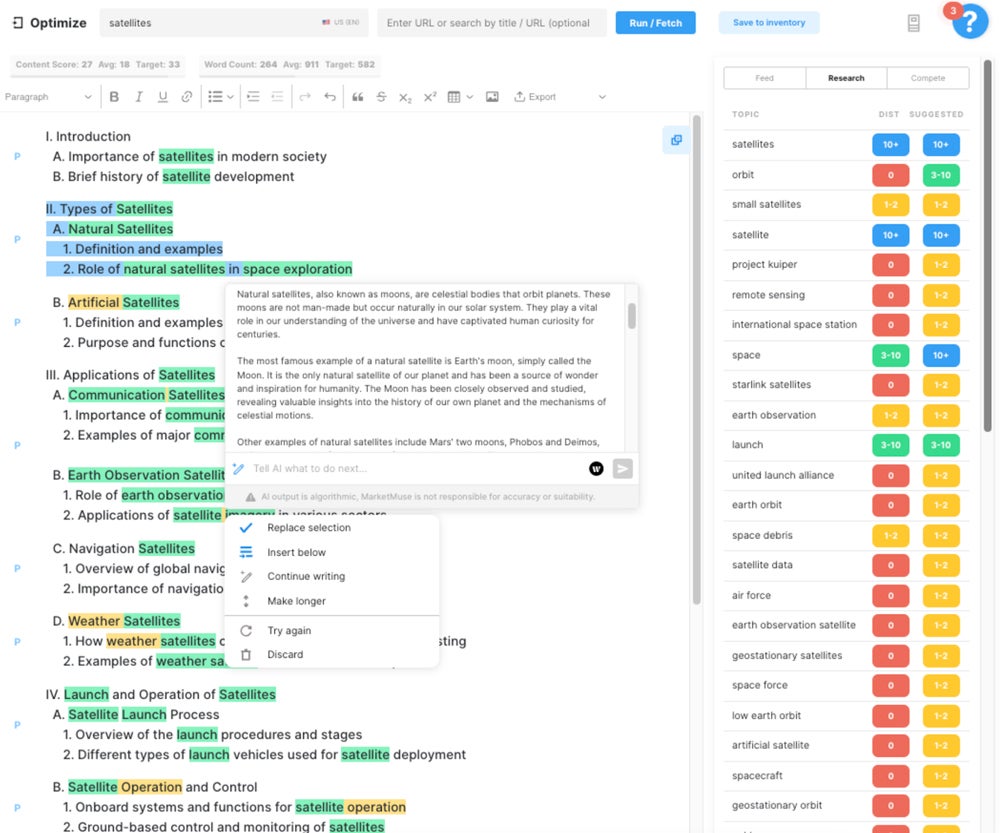 MarketMuse employs AI to help marketers publish high-quality content based on personalized insights.
MarketMuse employs AI to help marketers publish high-quality content based on personalized insights.
Analytics and Reporting Tools
AI-powered analytics and reporting tools make it easier for marketers to deliver personalized experiences by analyzing marketing campaigns, tracking personalization efforts, and determining opportunities for improvement. The right analytics and reporting tools empower businesses to make informed and strategic decisions for their marketing efforts and campaigns.
Microsoft Power BI is a robust AI-powered analytics and reporting tool specifically designed for business intelligence. This platform allows marketers to collect, visualize, and analyze marketing data to measure the impact of their personalized marketing solutions almost in real-time.
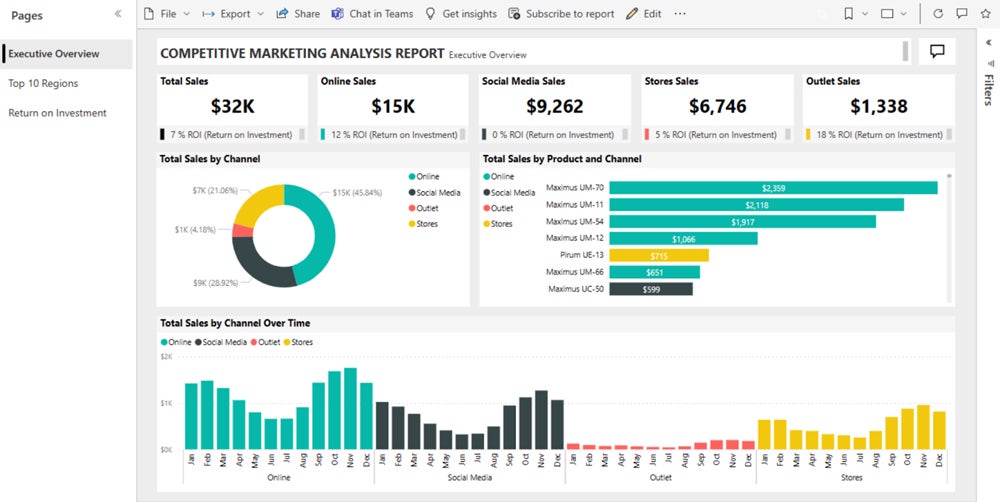 Microsoft Power BI’s competitive marketing analysis feature helps marketers create reports to keep an eye on the company’s market share, product volume, sales, and sentiment.
Microsoft Power BI’s competitive marketing analysis feature helps marketers create reports to keep an eye on the company’s market share, product volume, sales, and sentiment.
3 Recommended Coursera Courses for Learning AI Personalization Marketing
A number of online education providers offer training on all manner of artificial intelligence technologies. We recommend three in particular, provided by Meta, the University of Virginia, and the University of Colorado.
Artificial Intelligence in Marketing, University of Virginia
Developed at the Darden School of Business, this course delves into the fundamentals of AI and its application in marketing. You will learn about the three important factors that enable AI in marketing strategies: algorithms, networks, and data. You can explore how to harness data-driven AI solutions for improving customer experiences and see real-world examples of successful companies shaping their respective industries using AI. No prior experience is needed to participate in the course, making it an ideal introductory course for beginners.
Meta Social Media Marketing Professional Certificate, Meta
This professional certificate course helps prepare you for a career in social media marketing. You can receive professional-level training from Meta for using Meta Ads Manager to launch Facebook and Instagram ad campaigns and interpret results from these campaigns. After completing the six-course series, you can demonstrate proficiency in portfolio-ready projects and earn an employer-recognized certificate from Meta. Beginners who want to qualify for in-demand job titles such as social media manager, social media specialist, and social media coordinator will find this professional certification beneficial for their careers.
Machine Learning for Marketers, University of Colorado
This course helps you apply machine learning techniques to marketing and strategic decision-making, and you’ll learn to analyze and forecast customer behaviors using advanced algorithms. As part of the Data Science for Marketing Specialization, enrollment in this course also enrolls you in this specialization. Upon completion, you’ll gain skills such as campaign analysis and testing, predictive analytics in marketing, machine learning, personalized marketing strategies, and more. This course is offered at an intermediate level, so experience in marketing and a basic understanding of data analytics are recommended.
Bottom Line: The Future of AI Personalization Marketing
AI personalization is transforming how marketers and businesses connect with their customers, offering tailored experiences that boost conversions and drive growth. AI personalization in marketing entails various challenges and ethical considerations, necessitating an in-depth understanding of how to balance the use of AI with protecting customer privacy. The right AI tools and strategies will not only help businesses harness the full potential of AI in campaigns but also create a future where marketing is truly personalized for every individual.
Read our list of the top AI companies in 2024 and the leading AI startups to learn more about the businesses driving AI forward in marketing and other industries.




